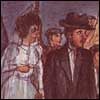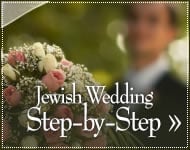The order of the procession, the people chosen, and the decor are varied and not important to the law. These arrangements should suit the taste of the couple, although traditions have developed over the centuries that may serve as guides.
The groom must arrive under the chuppah before the bride. After all, it is his symbolic home and legally he has leased it for the bridal chamber. The bride's transition from her parents' home to her husband's is demonstrated by this procession, and the chuppah affords the opportunity for that expression.
The selection of escorts (shushvinin) for the bride and groom is not explicitly described. The Rabbis playfully imagined the angels accompanying Adam and Eve, the first "bride" and "groom," at their wedding. At first, notes the Talmud, each had one accompanying person, to help them arrive properly under the chuppah. The tradition speaks of both fathers accompanying the groom and both mothers the bride; the Zohar tells of each being accompanied by the parents. There is no expression in all of Jewish tradition of the bride walking with her father only, as a symbol of the father "giving away" the bride.
In our times, complications arise from the large numbers of children of divorced parents. Arrangements are very rarely satisfactory. One possible method for parents who will not walk together at their child's side is to revert to the tradition of both fathers escorting the groom, and both mothers the bride. One major point must be kept uppermost in the minds of the parents: The children should not be used as instruments for revenge, or for parents to play out their anger. Traditional escorting is not sacrosanct; it does not have even the rank of rabbinic law. Quarreling, however, is prohibited by biblical law. It is foolish to allow such questions of mere ceremonial procession to cause controversy and mar the joy of bride and groom.
The importance attached by the tradition to accompanying the bride and groom derives, according to Tashbatz, from the idea that at this time they are king and queen, and royalty is never to be left alone. Another more practical consideration is gemillut chasadim, the simple kindness of being available to offer help and positive support, a steadying hand in a moment of tension and concern.
The wedding is the supreme definition of joy in Jewish life. The more people who share joy, the greater the joy felt by the couple.











Join the Discussion